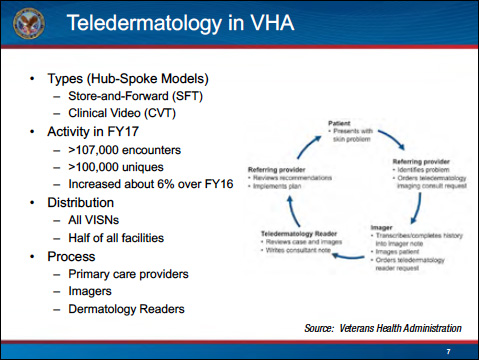ATLANTA—The VA has rolled out a number of telehealth initiatives over the last years, with remote visits to dermatologists being offered to more and more veterans.
But how well is the program working?
A new study maintained that teledermatology is comparable to face-to-face visits in providing accurate diagnoses and effective treatments, but it is not clear how patients feel about teledermatology models that more directly convey provider recommendations to patients.
The report in the Journal of the American Academy of Dermatology discussed results of efforts to assess patient satisfaction with the teledermatology service at the Atlanta VAMC.1
Emory University-led researchers conducted a cross-sectional, phone-based questionnaire study of 175 AVAMC teledermatology patients to investigate patient satisfaction. The first phase, involving 100 patients, compared teleconsultative and models, while the second phase, with 75 patients, compared those who received one of three possible consult outcomes: (1) reassurance, (2) appointment for biopsy or (3) appointment for face-to-face evaluation.
Researchers reported no statistically significant differences in satisfaction between patients who were seen with the telemedicine and teleconsultative models. “Patients who received appointments for face-to-face evaluation or biopsy were more satisfied than patients who received reassurance only,” study authors concluded. “Both phases were remarkable for high patient satisfaction among all cohorts.”
The researchers cautioned that the study was performed at a single VA medical center and is vulnerable to both nonresponse bias and recall bias, but added, “Overall, patients are satisfied with teledermatology services at the AVAMC. Strong partnership with referring primary care providers and clear delineation of responsibilities is vital to the teledermatology process.”

1 Baranowski MLH, Balakrishnan V, Chen SC. Patient Satisfaction with the Veteran’s Administration Teledermatology Service. J Am Acad Dermatol. 2019 Jan 28. pii: S0190-9622(19)30143-4. doi: 10.1016/j.jaad.2019.01.036. [Epub ahead of print] PubMed PMID: 30703451.

